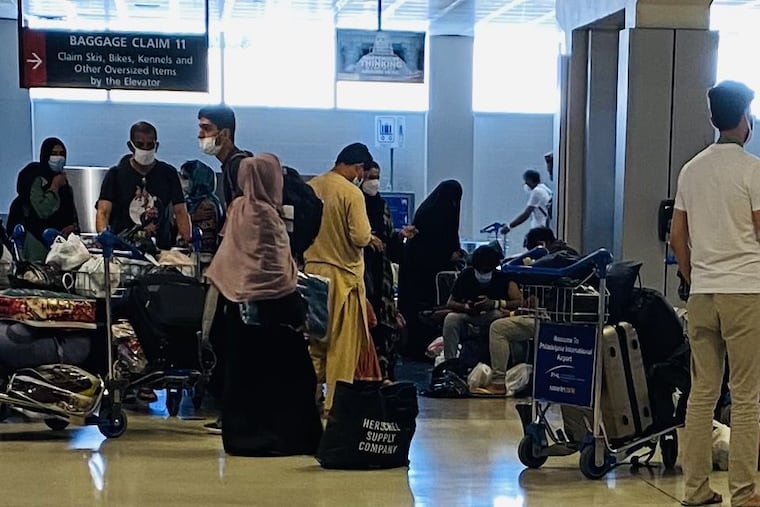Reliving my own resettlement through the hope and struggle of Afghans new to Philly | Opinion
Greeting Afghans at PHL now brings me back to when my own Afghan family came to Philadelphia in the '80s.

Although the news of the U.S. withdrawal from Afghanistan has left the front page of most newspapers, the story of people forced to flee their country because of the Taliban takeover has not ended. In fact, some Afghan families have landed in the front doors of Philadelphia.
The future for Afghan families who made it to the United States is still uncertain, with many falling under humanitarian parole status. Humanitarian parole is a different classification than refugees or immigrants. Refugees and immigrants have a path to lawful permanent resident status and eventual citizenship. A person on humanitarian parole has only temporary legal status, which comes with very few benefits. The risk of deportation for humanitarian parolees is great, with the likelihood that they’ll be forced back to their home country in one or two years.
This winter, Philadelphia will welcome 700 to 900 Afghans, most of them falling under the humanitarian parole status. We must work together to do more to help all Afghans resettle in the United States, but humanitarian parolees need the most aid.
Since late August, Philly has been the host airport for many Afghan humanitarian parolees airlifted and accepted to this country. I was honored to be a part of the medical triage team welcoming these tired, broken souls.
In the early days of their arrival, the experience of watching them at PHL Terminal A was unbelievable and as grounding as it gets. The families I met there were incredible — so thankful, so relieved, yet still so scared of the unknown. I’ll never forget the little kids playing soccer with military officers in baggage claim. We watched with tears realizing that for so many years, these officers were protectors and heroes to these children. The sound of resilience in a child’s laughter reminded all of us working there that amongst all the horror there was hope, and after darkness there was still light. I realized in these moments that I was witnessing a modern-day Ellis Island.
» READ MORE: ‘I hope to see the stars soon’: A day in the life of an Afghan woman who fled to America | Opinion
This work is near and dear to me because I am an Afghan American who immigrated to the United States via PHL from Europe in the early 1980s. I was 7 years old when I arrived, the same age as many of the kids I have greeted with “Salam, how can I help you?” over the last few months.
We were in Europe because my father received a Ph.D. in civil engineering as his way up and out of poverty. The Soviet Union invaded Afghanistan in 1978, creating one of several historic “brain-drains” of Afghans. For my father, going back to Afghanistan after Europe was not an option with a wife and two daughters. To get to America, we were sponsored through a church in West Philly and landed in housing on 43rd and Walnut Streets. Due to my father’s determination and qualifications — and the fact that he taught himself English reading and watching U.S. news while studying in Europe — we were able to, little by little, move up the American dream ladder: from Center City to Port Richmond to Delaware County. And for me, to West Chester to New York City, then back to Philadelphia again.
I thought of my own journey as I saw Afghans arriving in Philadelphia this summer. They all need our help to settle into a life and find their own American dream, but especially those who are classified as humanitarian parolees and have the most precarious status.
Congress could offer them an enormous amount of relief by passing the Afghan Adjustment Act, which would ensure a path to permanent residency for Afghan allies. Many of the Afghans coming here would meet the requirements for other forms of immigration if they had applied through normal channels, but didn’t have the opportunity because of how quickly the Taliban took over. The U.S. immigration process is also facing an enormous backlog.
Beyond legislative action, there are steps that everyday Philadelphians can take to aid Afghans:
Hiring: Afghan humanitarian parolees do receive work permits when “graduating” from a U.S. military base. Lutheran Immigration and Refugee Service has partnered with Tent Partnership for Refugees to create a guide on why and how to hire Afghans. Afghan special immigrant visa holders, refugees, and parolees are coming to this country with a wide variety of professional experiences, educational backgrounds, and skills, and can provide tremendous value to businesses.
Advocacy: Call or write your representatives to pass the Afghan Adjustment Act, a lifeline for Afghan humanitarian parolees.
Support: Several organizations are coordinating relief efforts, including the Afghans Rising Initiative and the Philadelphia Nationalities Service Center.
» READ MORE: For Afghans evacuated to the U.S., a choking fear for loved ones left behind
Although these times have sometimes been challenging for the U.S., for me, the experience of welcoming my people and helping them settle in their new home has brought me some closure as well as renewed hope. I lost my father last May, and this is my way of reconnecting to his heritage. I feel my life is coming full circle, as I am able to lend a hand to Afghans in the same way my family was lended one all those years ago.
Maria Aini is an emergency medicine physician in Philadelphia. She is supporting new Afghans through the resettlement process in the Philadelphia region through the Afghans Rising Initiative.